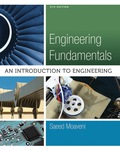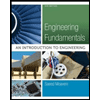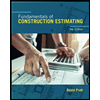
Concept explainers
Find the frontal area of the car in SI unit and U.S. Customary unit.
Answer to Problem 50P
The frontal area of the car in inches is
Explanation of Solution
Given data:
The height of the car
The width of the car
Formula used:
Formula to calculate the frontal area of the car is,
Here,
Calculation:
Total frontal area:
Formula to calculate the total frontal area of the car is,
Here,
Substitute
Area of the squares in which the parts of the car is not touched:
Refer to the figure 7.50, the height and width of the car is divided as slots. Therefore,
For 1 slot, the height (h) is:
For 1 slot, the width (w) is:
From the figure 7.50, approximately the total number of slots which is not touching the parts of car is 48.
Formula to calculate the area of the squares which is not touched by the parts of car is,
Here,
Substitute
Substitute
The SI unit of the frontal area of the car is,
The U.S. Customary unit of the frontal area of the car is,
Therefore, the frontal area of the car in SI unit and U.S. Customary unit is
Conclusion:
Thus, the frontal area of the car in SI unit, U.S. Customary unit and in inches is
Want to see more full solutions like this?
Chapter 7 Solutions
EBK ENGINEERING FUNDAMENTALS: AN INTROD
- Q2: Design an activated sludge process to treat a waste flow of 15000 m³/day with a BODs of 180 mg/L following primary treatment. The effluent BOD, and SS are to be 20 m mg/L. Assume Xr = 15000 mg/L, X = 2500 mg/L, 0c = 10 day, Y = 0.60, kd=0.05. Determine 1- the reactor volume, 2- the Sludge production rate, 3- the circulation rate, 4- the hydraulic retention time, and 5- the oxygen required? C₁-Ce C 1 XV = 1 +0.532 QxC₁₂ VXF F= - 1+r (1+0.1r)² = Qr= dt Өс Qx Xr-X V R = [= Q YQ(So-S) Oc dx XV 1+Kd0c O₂demand =1.47 (So-S)Q-[1.14Xr(Qw)] Qw total sludge production/X, S = BOD, effluent - 0.63 * SS Warrow_forwardمارت حولة ملانول 60 Design Deceleration tank and screen for W.W.T.P of flow-144000 m² day Design Data: D.T=1-3 min 1-3b, d=1-1.5 m 60 Design Data: velocity= 0.6: 1.5 m/sec . A-Qdfv=b.d, b=2d 233 Design Data: bars used circular of p= 1.5:3 cm. rec. of (1:2 cm) x (2:6 cm) spacing between bars 2.5:5.0 cm fine screen, 2.5 7.5 cm coarse screen Sloping angle on hz (6)=45:60 = depth of water depth in approaching channel=d = ⚫nbars nspacings +1 ⚫b=nbars xo+nspacings I spacing net inclined area = 2 Aapproach channel=nspacing. spacing. L. 1=d/ sin Check: = 1.13 C 2.56 1134(6.05 P. 45.30 *velocity just befor the screen=v₁ = Qa(m³/sec) screen-b.d ≥ 0.6 m/sec. * velocity through the screen=v2 16mm use 2 Qa(m³/sec) nscreens (spacings Spacing).d ≤1.5 m/sec IsP. 22-65 12²² head losses = Ah = 1.4 x ≤0.1 m 2g bav usp = Ubar Q 23.65 k 148.72arrow_forwardCan you please explain the steps of this problem especially the variables for Q when solving for the shear force? Thanks.arrow_forward
- Please show all your steps. Thank you.arrow_forwardThe solution to this problem is 10.5kip. Please explain all the steps.arrow_forwardQ1: Design of trickling filter system single-stage with 3m depth, effluent BOD, of 20 mg/l, influent BODs =250mg/l, flow = 2.63 m³/min and hydraulic flow rate or hydraulic loading rate 25 m/day, r=3arrow_forward
- 04 Q4 A waste effluent of 1.25 m/s with BOD, 183 mg/L, DO=0 mg/L and T = 20 °C is to be discharged into a river of 8 m³/s flow, BOD, = 2mg/L, DO -9.14 mg/L and T= 15 °C. At 20 °C, (K₁) is 0.3/day and (K2) is 0.9/day. The average velocity of the river is 0.8 m/s. 1) Is DO min within the environmental limitations? 2) At what distance is the maximum deficit located. 3) Draw the oxygen sag curve? Given the saturation concentration at 15 °C and at mixed temperature = 10.15 mg/Larrow_forwardCalculate 1- the effluent BOD, of a two-stage trickling filter with the following flows, BOD, and dimensions? Q-5000 m³/day, influent BOD,-280 mg/L, volume of first filter-1000 m³, volume of second filter-800 m³, filter depth-2 m, r₁=1, z=1.25. Also, 2- calculate organic loading rate (BOD, kg/day) 3- Hydraulic loading (m³/m²/d), 4- efficiency of each stage 5- overall removal efficiency.arrow_forwardQ3: Determine the force in each member of the shown truss, and state whether they are tension or compression. 40 kN 3 m 10 kN A 25-1.25 m m -3.5 m- 3 m Barrow_forward
- Q3 Design a secondary clarifier for an activated sludge process with a recycle rate of 25 percent, a MLSS conc. 2500 mg/L, peak flow 9,000 m²/day, depth of tank 3 m and solid loading rate = 4 kg/m²/hrarrow_forwardA- Design grit removal chamber for a W.W.P with hourly flow equal 5000 m'h 410 markarrow_forward05 An average operating data for conventional activated sludge treatment plant is as follows: (1) Wastewater flow, Q-50000m/d (2) Volume of aeration tank, V-12000m (3) Influent BOD, Y.- 300 mg/1 (4) Effluent BOD, YE - 25 mg/1 (5) Mixed liquor suspended solids (MLSS), X₁ = 2500mg/1 (6) Effluent suspended solids, Xg30mg/1 (7) Waste sludge suspended solids, X-9700mg/1 (8) Quantity of waste sludge, Q., -220m³/d Based on the information above data, determine: (a) Aeration period (hrs.) (b) Food to microorganism ratio (F/M) (kg BOD per day/kg MLSS) (c) Percentage efficiency of BOD removal (d) Sludge age (days)arrow_forward
 Engineering Fundamentals: An Introduction to Engi...Civil EngineeringISBN:9781305084766Author:Saeed MoaveniPublisher:Cengage Learning
Engineering Fundamentals: An Introduction to Engi...Civil EngineeringISBN:9781305084766Author:Saeed MoaveniPublisher:Cengage Learning Fundamentals Of Construction EstimatingCivil EngineeringISBN:9781337399395Author:Pratt, David J.Publisher:Cengage,
Fundamentals Of Construction EstimatingCivil EngineeringISBN:9781337399395Author:Pratt, David J.Publisher:Cengage,

